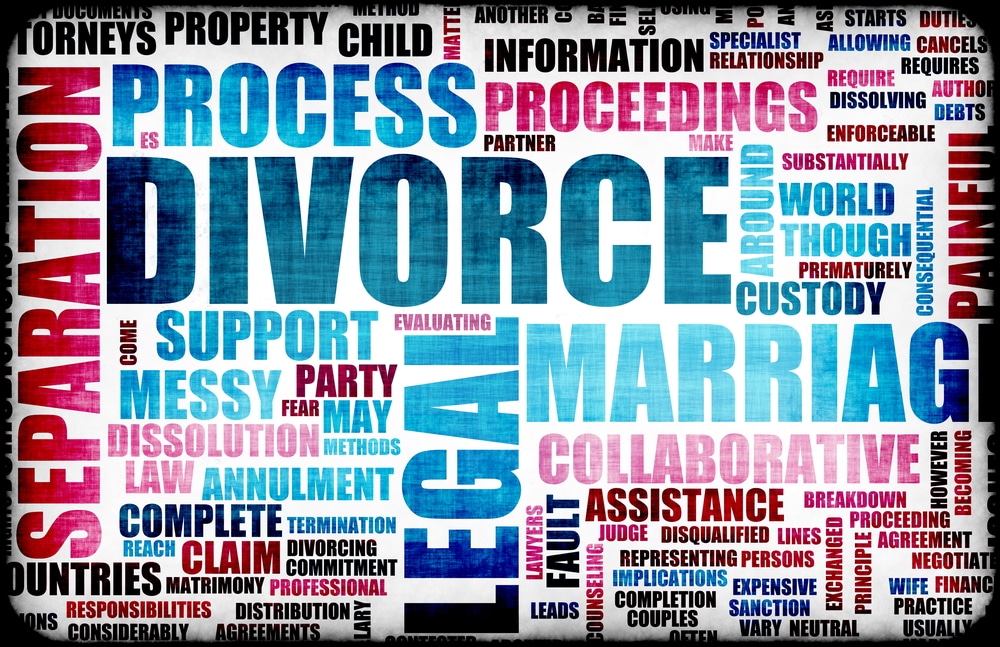Divorce in Arizona: Six Things To Know About a Divorce in AZ

Table of Contents
Six Things You Must Know About Arizona Divorce Laws
You must understand Arizona divorce laws if you consider going through a divorce in AZ. If you have not filed for divorce before, there are many common questions you will likely have about filing for divorce, such as:
- The Arizona divorce law requirements for filing for divorce in Arizona?
- How long it takes to get divorced in Arizona?
- How much will the divorce will cost?
- What happens to the kids when you choose divorce?
- How is child support and alimony decided in a divorce in Arizona?
- How are property and debts divided in an Arizona divorce?

These are all critical questions to ask, and we will provide you with answers to all of them.
Arizona divorce laws can be very complex. So your Arizona divorce attorney must have a good understanding of Arizona divorce laws, as well as the process of a divorce.
Experience matters, so hire a divorce attorney who has the expertise to know what a judge is likely to do in your case. The attorneys at Hildebrand Law, PC, have over 100 years of combined experience in divorce and related family law cases in Arizona.
So, let’s start with the Arizona divorce law requirements for filing a divorce in AZ.
#1 Arizona Divorce Law Requirements for Filing Divorce in Arizona
Arizona Divorce Law Residency Requirements for Filing for Divorce
Arizona Revised Statute Section 25-312(1) requires that either you or your spouse must be a resident of Arizona for at least 90 days to file for divorce in Arizona.
The Arizona Court of Appeals in the case of Vilaysane v. Vilaysane addressed whether a person temporarily living in another state is an Arizona resident. That decision held that continuous presence is Arizona is not required to continue to maintain domicile in Arizona.
So, a person may, in some cases, still meet the Arizona legal residency requirements for a divorce even if neither spouse lives in Arizona.
Arizona Divorce Law Requirements for Compliance With Conciliation Services Statutes
Arizona Revised Statute Section 25-381.09, referred to as the Arizona Conciliation statute, allows a spouse to request free marital counseling to attempt to save a marriage within the first sixty days after a spouse serves the divorce petition on the other party.
The spouses must either use those services or agree on using those services with not help save the marriage, under Arizona Revised Statute Section 25-312(2) and 25-312(3), before a judge can issue a divorce decree.
Arizona Divorce Laws Preclude a Bifurcated Divorce
Arizona Revised Statute Section 25-312(4) requires a court to enter orders for the following before entering a divorce decree:
Divide the parties’ assets and debts;
Enter child custody orders;
Enter child support order;
Enter spousal maintenance orders, if appropriate;
A court, therefore, is not allowed to enter a divorce decree without dividing community assets and debts and entering custody and support orders. Simply divorcing people without dealing with these other issues, referred to as a bifurcated divorce, is not permitted in Arizona.
Divorce Papers and Filing Fees
Once you decide to file for divorce, you must submit the correct divorce documents with the Clerk of the Court.
The materials include a Petition for Dissolution of Marriage, a Summons, a Preliminary Injunction, a Sensitive Data Sheet, and a Notice of Right to Convert Health Insurance.
According to Arizona Revised Statute Section 25-314(a), the divorce petition must contain the following information:
- The birth date, occupation, and address of each party and the length of domicile in this state;
- The date of marriage, place where the wedding took place, and whether the marriage is a covenant marriage;
- The names, birth dates, and addresses of all living children, natural or adopted, common to the parties and whether the wife is pregnant;
- The details of any agreements between the parties as to support, custody, and parenting time of the children and maintenance of a spouse;
- The relief sought.
You are also required to pay a filing fee of to the Clerk of the Court.
You may, however, apply for the Court to waive your filing fee if you cannot afford to pay it.
Service of Process of Divorce Papers
Once you have filed your divorce papers with the Court, you must have those divorce documents served on your spouse.
Most people use a process server to deliver divorce papers to a spouse.
Most process servers charge less than $100.00 to serve divorce papers on your spouse.
Some police officers will agree to serve the divorce papers.
You may also use the Sheriff’s office to deliver the divorce papers to your spouse.
Regardless of who you use to serve the divorce documents on your spouse, that person will need to complete an Affidavit of Service declaring when and where service of the divorce papers occurred.
That Affidavit of Service is then filed in your divorce case to prove proper service of the documents on your spouse.
Some people ask if they can hand the divorce papers to their husband or wife. The simple answer is no. You cannot serve your spouse by giving them the divorce documents you filed with the Court.
However, your spouse may sign an Acceptance of Service in the presence of a notary.
That Acceptance of Service is then filed with the Court to inform your judge of proper service of the divorce papers on your spouse.
In some cases, you may need to use an alternative way to serve your spouse with the divorce papers if you cannot locate them. In one particular case, the Court permitted service by email.
If you need help filing for divorce in Arizona, you should call the attorneys at Hildebrand Law, PC at (480)305-8300. We are standing by to help you!
#2 How Long Does it Take to Get a Divorce in Arizona

Uncontested Divorce Cases
Many people want to know how long an uncontested divorce takes. The length of time it will take to get a divorce in Arizona varies from case to case.
Some divorces are relatively simple, while others can be complicated or high conflict.
A divorce case that settles early in the divorce process can take as little as 60 to 120 days to complete.
These cases are typically called no-contest or an uncontested divorce.
Contested Divorce Cases
Depending on the contested issues, a contested divorce case can take one to two years.
Psychologists may need to evaluate the family if significant disputes exist over custody of the children.
Financial experts may need to evaluate the income of a self-employed spouse if there is a dispute regarding how much they earn.
A business appraiser may need to appraise a business if there is a dispute about the value of a company owned by one of the spouses.
If you have questions about how long your divorce is taking, you should call the attorneys at Hildebrand Law, PC, at (480)305-8300. We use a comprehensive and organized case strategy in all of our divorce cases.
#3 How Much Will The Divorce Cost

Cost of an Uncontested or No-Contest Divorce
The average cost of a divorce is between $15,000.00 to $30,000.00, according to an article published by Forbes in 2006.
However, every case is different, and the money you will spend will depend upon your particular circumstances.
A settled divorce will typically cost between $2,500.00 to $3,500.00 to complete.
Cost of a Contested Divorce in Arizona
More complex or high conflict divorce cases can easily top the $30,000.00 national average.
Four people will have the most significant impact on how much your Arizona divorce will cost.
Specifically, you, the attorney you hire, your spouse, and the attorney they employ.
It takes just one of these people involved in your divorce to drive your divorce costs up.
They run your divorce cost up by simply being unreasonable.
Another reason your divorce costs can rise is if you have complex issues to resolve.
Allegations of child abuse and domestic violence can significantly increase the price of a divorce.
The Court may appoint experts to evaluate child abuse and domestic violence allegations.
Those experts can charge between $5,000.00 to $10,000.00 to evaluate and assess child custody disputes.
Your cost of getting a divorce can also rise if you have complex financial issues.
Some retirement accounts require creating a Qualified Domestic Relations Order to divide those retirement accounts without making a taxable consequence.
Determining the value of a business owned by a spouse may also require a financial expert to evaluate a company’s financial statements to assess the value of that business.
These experts can charge anywhere between a few thousand dollars to divide retirement accounts to as much as $15,000.00 to conduct a business appraisal.
#4 What Happens to the Kids in a Divorce in Arizona

Both parents have parental rights to their children. These rights include the right to the care, custody, and control of their children.
Neither parent’s rights to direct their children’s care, custody, and control are superior to the other parent’s when you file for divorce.
Both parents continue to have the same rights to their children.
It is not very helpful to know both parents have equal rights if they disagree regarding the children’s schedule with each parent.
Arizona Title 25 Chapter 4 contains the laws that apply to children in a divorce in Arizona. Arizona statute section 25-403 requires the Court to consider the following child custody factors in a divorce case before a judge issues child custody orders:
- The past, present, and potential future relationship between the parent and the child;
- The interaction and interrelationship of the child with the child’s parent or parents, the child’s siblings, and any other person who may significantly affect the child’s best interest;
- The child’s adjustment to home, school, and community;
- If the child is of suitable age and maturity, the wishes of the child as to legal decision-making and parenting time;
- The mental and physical health of all individuals involved;
- Which parent is more likely to allow the child frequent, meaningful, and continuing contact with the other parent. This paragraph does not apply if the Court determines that a parent is acting in good faith to protect the child from witnessing an act of domestic violence or being a victim of domestic violence or child abuse;
- Whether one parent intentionally misled the court to cause an unnecessary delay, to increase the cost of litigation, or to persuade the Court to give a legal decision-making or a parenting time preference to that parent;
- Whether there has been domestic violence or child abuse according to section 25-403.03;
- The nature and extent of coercion or duress used by a parent in obtaining an agreement regarding legal decision-making or parenting time;
- Whether a parent has complied with chapter 3, article 5 of this title;
- Whether a Court convicted either parent was guilty of an act of false reporting of child abuse or neglect under section 13-2907.02;
Most good attorneys will work together to help parents reach agreements regarding a parenting schedule that meets the best interests of their clients’ children.
Sometimes, parents will reach interim agreements regarding a parenting schedule that will be in place until a court can schedule a temporary orders hearing.
The Court will issue child custody orders that remain in effect until the case settles or the Court enters final child custody orders.
Most good attorneys will also advise their clients about a divorce’s harmful effects on children.
It would be best to consider ways you and your spouse can protect the children from the detrimental effects of a divorce on your children.
#5 How is Child Support and Alimony Decided in a Divorce

Child Support in an Arizona Divorce
Arizona Revised Statute Section 25-501(A) is the law in Arizona that provides that every parent has to support their children financially.
The Arizona Child Support Guidelines determine the amount of child support a parent should pay.
The calculation uses the parents’ incomes.
The Guidelines also consider the cost of providing health insurance for the children and daycare costs.
The amount of time each parent spends with the children also affects the child support ordered in a divorce.
Alimony in a Divorce in Arizona
Arizona Revised Statute Section 25-319 allows a judge to order a spouse to pay alimony or spousal maintenance to the other spouse.
Alimony may or may not be appropriate in your case. Suppose the Court determines alimony or spousal maintenance is appropriate. In that case, Arizona Revised Statute Section 25-319(B) requires the Court to consider the following factors when entering such a financial support order:
- The standard of living established during the marriage;
- The duration of the marriage;
- The age, employment history, earning ability, and physical and emotional condition of the spouse seeking maintenance;
- The ability of the spouse from whom maintenance is sought to meet that spouse’s needs while meeting those of the spouse seeking maintenance;
- The comparative financial resources of the spouses, including their comparative earning abilities in the labor market;
- The contribution of the spouse seeking maintenance to the earning ability of the other spouse;
- The extent to which the spouse seeking maintenance has reduced that spouse’s income or career opportunities for the benefit of the other spouse;
- The ability of both parties after the dissolution to contribute to the future educational costs of their mutual children;
- The financial resources of the party seeking maintenance, including marital property apportioned to that spouse, and that spouse’s ability to meet that spouse’s own needs independently;
- The time necessary to acquire sufficient education or training to enable the party seeking maintenance to find appropriate employment and whether such education or training is readily available;
- Excessive or abnormal expenditures, destruction, concealment or fraudulent disposition of community, joint tenancy and other property held in common;
- The cost for the spouse who is seeking maintenance to obtain health insurance and the reduction in the price of health insurance for the spouse from whom maintenance is sought if the spouse from whom maintenance is sought is able to convert family health insurance to employee health insurance after the marriage is dissolved;
- All actual damages and judgments from conduct that resulted in criminal conviction of either spouse in which the other spouse or a child was the victim;
The Court can award alimony if a spouse does not earn enough income to support themselves.
The Court can also award spousal support if a spouse cares for a child so young they should not be expected to work.
The Court will consider the amount of property a spouse will receive and can even award alimony if one spouse has contributed to the education or career of the other spouse.
The Court must consider the following factors when deciding how much alimony to award a spouse in a divorce:
- The standard of living established during the marriage;
- The duration of the marriage;
- The age, employment history, earning ability, and physical and emotional condition of the spouse seeking maintenance;
- The ability of the spouse from whom maintenance is sought to meet that spouse’s needs while meeting those of the spouse seeking support;
- The comparative financial resources of the spouses, including their relative earning abilities in the labor market;
- The contribution of the spouse seeking maintenance to the earning capacity of the other spouse;
- The extent to which the spouse seeking support has reduced that spouse’s income or career opportunities for the benefit of the other spouse;
- The ability of both parties after the dissolution to contribute to the future educational costs of their mutual children;
- The financial resources of the party seeking maintenance, including marital property apportioned to that spouse, and that spouse’s ability to meet that spouse’s own needs independently;
- The time necessary to acquire sufficient education or training to enable the party seeking maintenance to find appropriate employment and whether such education or training is readily available;
- Excessive or abnormal expenditures, destruction, concealment or fraudulent disposition of community, joint tenancy and other property held in common;
- The cost for the spouse who is seeking maintenance to obtain health insurance. The reduction in the price of health insurance for the spouse providing the support. If the spouse providing support can convert family health insurance to employee health insurance after the divorce;
- All actual damages and judgments from conduct that resulted in a criminal conviction of either spouse in which the other spouse or a child was the victim;
#6 Who Gets the House and How are Property and Debts Divided in an Arizona Divorce

Arizona Revised Statute Section 25-318 requires the Court to divide all community property in a divorce equitably. That same statute also requires the Court to confirm their respective sole and separate property to each spouse.
It does not matter whether the wife, the husband or both spouses purchased the property during the marriage. According to the case of Sommerfield v. Sommerfield, community property is presumed to be all property acquired during the marriage. However, there are some exceptions to this general rule.
The process of dividing community property consists of the following stages:
- Identifying Community Property;
- Valuing Community Property;
- Dividing Community Property;
Identifying Community Property in a Divorce in Arizona
You should create a list containing all the property you and your spouse acquired during the marriage.
The list should include all physical assets, such as a home or vehicles, as well as all financial accounts.
There may be tax consequences when dividing some assets in a divorce.
For example, you will be taxed and penalized for withdrawing money from retirement accounts to divide those accounts.
Instead of cashing out retirement accounts, you can divide retirement and other tax-deferred investment accounts through Qualified Domestic Relations Orders.
Such orders divide retirement accounts without creating a taxable event.
You should consult with a qualified Arizona divorce attorney regarding the best way to divide your assets.
Valuing Community Property in a Divorce
It would be best to determine how much your property is worth before deciding how to divide your property fairly.
Determining the value of your assets may require you to obtain an appraisal of your home.
You will need to exchange account statements for your financial accounts to determine how much money was in those accounts when you filed for divorce.
You will also have to disclose account statements establishing the number of unpaid debts you and your spouse may have to divide those liabilities.
It is preferable to pay off all debts before filing for divorce in Arizona or as a part of a property settlement agreement.
Many problems can arise if you are still on the hook for a credit card debt the Court ordered your spouse to pay but, for some reason, did not get paid.
You do not want to hire an attorney after your divorce to enforce court orders requiring your former spouse to pay debts.
Dividing Community Property in a Divorce
Create a spreadsheet listing all assets in your name and the name of your spouse.
You should also include a list of the debts in the spreadsheet. You can then add your assets and liabilities values to the spreadsheet.
You should then total the numbers to see if your proposed property division gives each spouse about half of the assets and debts.
You can ask the Court to order your spouse to pay a property equalization payment to you if the division of debts and assets is not equal.
Property equalization payments provide flexibility in dividing assets in an Arizona divorce.
It is essential to be methodical in searching a good divorce attorney.
They must be someone with whom you get along well, and they must have mastered the various divorce laws and procedures.
Divorce Laws and Statutes in Arizona

Title twenty-five of the Arizona Revised Statutes contains all Arizona divorce laws. The Arizona Court of Appeals and the Arizona Supreme Court interpret those laws in their decisions.
Arizona Marriage Laws and Statutes
Chapter one of title twenty-five of the Arizona Revised Statutes covers three Arizona divorce laws areas: the Capacity to Marry, the Validity of a Marriage, and Marriage Licenses and Ceremonies. You will want to review these laws if you have a question regarding the validity of your marriage. The statutes start at Arizona Revised Statute section 25-101 and end in section 25-130.
Arizona Dissolution of Marriage Laws and Statutes
Chapter three of title twenty-five of the Arizona Revised Statutes cover four areas of Arizona divorce laws; specifically,
Annulment of a Marriage, Dissolution of a Marriage, Domestic Relations Education on Children Issues, and the Arizona Court of Conciliation. The statutes start at Arizona Revised Statute section 25-301 and end at section 25-381.24.
You should review these Arizona divorce laws if you have questions about getting an annulment of your marriage or a divorce. You will also want to look at these statutes if you need information about the required domestic relations education class or seek conciliation counseling to save your marriage.
Arizona Property Division Laws and Statutes
Chapter two of title twenty-five of the Arizona Revised Statutes cover two areas of Arizona divorce laws, specifically, Premarital Agreements and Property rights between married individuals. The statutes start at Arizona Revised Statute Section 25-201 and end in section 25-218. You should review these Arizona divorce laws if you have questions regarding a Premarital Agreement or how a court divides community property and separate property in a divorce in Arizona.
Legal Decision Making and Parenting Time (Child Custody) Laws and Statutes
Chapter four of title twenty-five of the Arizona Revised Statutes covers the topics of legal decision-making and parenting time, sometimes called child custody. The statutes start at Arizona Revised Statute section 25-401 and end at section 25-416. You will want to look at these Arizona divorce laws if you search for Arizona laws about child custody or parenting time.
Arizona Family Support Laws and Statutes
Chapter five of title twenty-five of the Arizona Revised Statutes covers the topics of child support, medical support for children, enforcement of spousal maintenance, and child support arrest warrants. The statutes start at Arizona Revised Statute section 25-501 and end at 25-685. You will want to review these laws if you search for Arizona divorce laws about child support or enforcement of child support or spousal maintenance orders.
Arizona Covenant Marriage Laws and Statutes
Chapter seven of title twenty-five of the Arizona Revised Statutes covers the topics of covenant marriage in Arizona. The statutes begin at Arizona Revised Statute Section 25-901 and end at 25-906. You should read these Arizona divorce laws if you consider entering into a covenant marriage in Arizona or are seeking a divorce in a covenant marriage.
Uniform Child Custody Jurisdiction and Enforcement Act Laws and Statutes
Chapter eight of title twenty-five of the Arizona Revised Statute covers the topics of the Uniform Child Custody Jurisdiction and Enforcement Act. The UCCJEA addresses an Arizona court’s authority to enter child custody orders in Arizona or to enforce a child custody order issued in another state. The statutes begin at Arizona Revised Statute section 25-1001 and end at 25-1067.
You will want to read these Arizona divorce laws if you’re going to learn about the requirements for an Arizona court to either issue or modify a child custody order. You also need to read these statutes to enforce a child custody order from another state. The laws also cover how you register another state’s child custody order in Arizona.
Uniform Interstate Family Support Act Laws and Statutes
Chapter nine of title twenty-five of the Arizona Revised Statutes covers the Uniform Interstate Family Support Act topics. The UIFSA addresses an Arizona court’s authority to enter child support or spousal maintenance orders in Arizona or enforce a child support or spousal maintenance order issued in another state. The statutes begin at Arizona Revised Statute section 25-1201 and end at 25-1362.
These laws govern the requirements for an Arizona court to either issue or modify child support or spousal maintenance order. The statutes also cover how you register another state’s child support or spousal maintenance order in Arizona. You also need to review these laws to enforce a child support or spousal maintenance order from another state.
The Legitimacy of Children Laws and Statutes
Chapter ten of title twenty-five of the Arizona Revised Statutes covers the topic of the legitimacy of children born outside of wedlock in Arizona. The only statute in this chapter is 25-1401 is the only law in this section. The statute contains the Arizona Paternity law providing that every child is the legitimate child of their natural parents; regardless whether the child’s parents were or were not married to each other.
Hiring the Right Divorce Attorney
The attorney you hire will also affect how long your divorce will take.
An organized divorce attorney can speed your divorce through the steps of divorce more quickly than a disorganized divorce attorney.
The attorneys at Hildebrand Law, PC intentionally have a caseload of about half of what other divorce law firms give to their attorneys.
We do this to ensure we push our divorce cases faster than other law firms.
Our detailed preparation provides us with the advantage of building our divorce cases much quicker and efficiently.
If you need information about Arizona divorce laws, you should seriously consider contacting the attorneys at Hildebrand Law, PC. Our Arizona divorce attorneys have decades of combined experience successfully representing clients in divorce cases in Arizona.
Our family law firm has earned numerous awards such as US News and World Reports Best Arizona Family Law Firm, US News and World Report Best Divorce Attorneys, “Best of the Valley” by Arizona Foothills readers, and “Best Arizona Divorce Law Firms” by North Scottsdale Magazine.
Call us today at (480)305-8300 or reach out to us through our appointment scheduling form to schedule your personalized consultation and turn your Arizona divorce case around today.
Contact Form

Frequently Asked Questions About Arizona Divorce:
When can I file for divorce in Arizona?
You can file for divorce in Arizona when either you or your spouse has been a resident of Arizona for at least 90 days. However, the spouses must have a significant connection with Arizona to allow the court to divide property, divide debts, and issue spousal support and child support orders.
More Articles About Divorce in Arizona
- PHANTOM INCOME IN A DIVORCE IN ARIZONA
- BUYING A HOUSE DURING A DIVORCE IN ARIZONA
- INTERNATIONAL DIVORCE IN ARIZONA
- PROTECT YOURSELF DURING A DIVORCE IN ARIZONA
- MOVING OUT OF THE HOUSE DURING A DIVORCE IN ARIZONA
- ASKING YOUR SPOUSE FOR A DIVORCE IN ARIZONA
- WHAT HAPPENS TO EMBRYOS IN A DIVORCE IN ARIZONA
- WHAT SHOULD I DO BEFORE FILING FOR DIVORCE IN ARIZONA
- HOW SHOULD A MAN PREPARE FOR DIVORCE
- LATE DISCLOSURE OF EXPERT WITNESS REPORTS IN AN ARIZONA DIVORCE
- CAN YOU SELL PROPERTY BEFORE A DIVORCE IN ARIZONA
- HOW TO ASK YOUR SPOUSE FOR A DIVORCE IN ARIZONA
- HOW DIVORCE CAN IMPACT SOCIAL SECURITY BENEFITS
- IS IT SMART TO BUY A HOUSE AFTER A DIVORCE
- WHEN A DIVORCE IS FINAL IN ARIZONA
- EFFECT OF CHANGING JUDGES DURING A DIVORCE
- FAILURE TO SIGN VERIFICATION OF DIVORCE FORM IN ARIZONA
- ENFORCING A PROMISE IN A DIVORCE IN ARIZONA
- SELLING A HOUSE DURING A DIVORCE IN ARIZONA
- DIVORCING A NARCISSIST IN ARIZONA
- CAN A JUDGE REJECT A DIVORCE SETTLEMENT IN ARIZONA
- NARCISSIST DIVORCE ADVICE IN ARIZONA
- HOW TO WORK EFFECTIVELY WITH AN ATTORNEY WHEN YOU DIVORCE A NARCISSIST
- FINDING THE RIGHT DIVORCE ATTORNEY: SECURE THE BEST REPRESENTATION FOR YOUR CASE
- DIVORCE TIPS IN ARIZONA
- DIVIDING CONTINGENCY FEES IN A DIVORCE IN ARIZONA
- TIPS ON HIRING A DIVORCE LAWYER
- AWARD OF MONEY IN AN ARIZONA DIVORCE
- DIFFERENCE BETWEEN A COMPLETE AND PARTIAL DIVORCE AGREEMENT
- WHAT TO DO IF YOUR SPOUSE IS HIDING ASSETS IN A DIVORCE IN ARIZONA
- INTEREST ON A JUDGMENT IN AN ARIZONA DIVORCE
- INTEREST ON A JUDGMENT IN AN ARIZONA DIVORCE DECREE
- MISSED COURT DATE IN AN ARIZONA DIVORCE
- WHAT HAPPENS IF SOMEONE LIES IN A DIVORCE IN ARIZONA
- VALUING A HOUSE DURING A DIVORCE IN ARIZONA
- TRAUMATIC STRESS AND DIVORCE IN ARIZONA
- TAXES AND DIVORCE SETTLEMENTS IN ARIZONA
- STATUTE OF LIMITATIONS ON A DIVORCE DECREE IN ARIZONA
- AUTHORITY OF DIVORCE COURTS TO REQUIRE A RELIGIOUS DIVORCE
- FAILURE TO PROVIDE EVIDENCE OF THE VALUE OF PROPERTY IN AN ARIZONA DIVORCE
- VALUING A PENSION PLAN IN A DIVORCE IN ARIZONA
- ENFORCING A PREMARITAL AGREEMENT IN A DIVORCE IN ARIZONA
- CHANGING POSITIONS DURING A DIVORCE TRIAL IN ARIZONA
- FALSE ACCUSATIONS OF DOMESTIC VIOLENCE IN AN ARIZONA DIVORCE
- DENIAL OF SPOUSAL SUPPORT AS A SANCTION IN AN ARIZONA DIVORCE
- VALIDITY OF A MARRIAGE IN ARIZONA WHEN THE MARRIAGE LICENSE IS NOT FILED
- WAIVER OF DIVORCE MEDIATION CONFIDENTIALITY IN ARIZONA
- GUIDE TO DIVORCE FOR MEN
- WHAT TO DO WHEN SERVED WITH DIVORCE PAPERS
- WHAT SHOULD I DO BEFORE FILING DIVORCE IN ARIZONA
- WHAT REASONS DO I NEED TO OBTAIN A DIVORCE IN A COVENANT MARRIAGE IN ARIZONA
- WHAT IS A TEMPORARY ORDERS HEARING IN ARIZONA
- WHAT IS A PRELIMINARY INJUNCTION IN AN ARIZONA DIVORCE
- WHAT IS A FAMILY LAW MASTER IN AN ARIZONA DIVORCE CASE
- WHAT IS A DEFAULT DIVORCE IN ARIZONA
- THE DEFINITIVE GUIDE TO THE 8 STEPS OF THE ARIZONA DIVORCE PROCESS
- WHAT IS A COVENANT MARRIAGE IN ARIZONA
- WHAT HAPPENS IF MY DIVORCE CASE GOES TO TRIAL IN ARIZONA
- WHAT HAPPENS AT A TEMPORARY ORDERS HEARING IN ARIZONA
- WHAT HAPPENS AT A RESOLUTION MANAGEMENT CONFERENCE IN ARIZONA
- WHAT DOES IT MEAN WHEN YOUR DIVORCE CASE IS ON THE INACTIVE CALENDAR
- STOP AN ARIZONA DIVORCE
- SOCIAL MEDIA EVIDENCE IN AN ARIZONA DIVORCE
- SHOULD I KEEP THE HOUSE IN A DIVORCE IN ARIZONA
- 7 DOCUMENTS YOU NEED TO FILE FOR DIVORCE ARIZONA
- SERVING DIVORCE PAPERS BY PUBLICATION IN ARIZONA
- WHAT DO I DO IF I AM SERVED WITH DIVORCE PAPERS
- SELLING COMMUNITY PROPERTY DURING A DIVORCE IN ARIZONA
- SEALING COURT RECORDS IN AN ARIZONA DIVORCE
- RUNNING OUT OF TIME DURING A FAMILY LAW TRIAL IN ARIZONA
- REASONS TO FILE FOR DIVORCE IN ARIZONA
- QUICK DIVORCE IN ARIZONA
- PARENTING CLASS DURING A DIVORCE IN ARIZONA
- WHAT IS A NO FAULT DIVORCE IN ARIZONA
- MODIFYING A DIVORCE DECREE IN ARIZONA
- MISLED INTO SIGNING A DIVORCE SETTLEMENT IN ARIZONA
- MERGER OR INCORPORATION OF A SETTLEMENT AGREEMENT IN ARIZONA
- MARITAL SETTLEMENT AGREEMENTS IN ARIZONA
- UNCONTESTED DIVORCE IN ARIZONA
- HOW TO OBTAIN A DIVORCE AFTER A LEGAL SEPARATION IN ARIZONA
- HOW TO GET AN AMICABLE DIVORCE IN ARIZONA
- SAME SEX DIVORCE IN ARIZONA
- UNREASONABLE DELAY IN CONTESTING PATERNITY IN AN ARIZONA DIVORCE
- HOW TO TELL IF YOUR SPOUSE IS HIDING ASSETS IN AN ARIZONA DIVORCE
- HOW TO GET A DIVORCE IN ARIZONA WHEN YOU CANNOT FIND OR LOCATE YOUR SPOUSE
- HOW DO I FIND A GOOD DIVORCE ATTORNEY IN ARIZONA
- HOW TO APPEAL A DIVORCE DECREE IN ARIZONA
- HOW MUCH DOES A DIVORCE COST IN ARIZONA
- HOW LONG DOES AN UNCONTESTED DIVORCE TAKE IN ARIZONA
- HOW LONG DOES IT TAKE TO GET TEMPORARY ORDERS IN AN ARIZONA DIVORCE CASE
- HOW LONG DOES A CONTESTED DIVORCE CASE TAKE IN ARIZONA
- HOW LONG DO YOU HAVE TO BE SEPARATED BEFORE DIVORCE IN ARIZONA
- HOW IS A DIVORCE FINALIZED IN ARIZONA
- HIGH NET WORTH DIVORCE IN ARIZONA
- HIGH CONFLICT DIVORCE IN ARIZONA
- HIGH ASSET DIVORCE IN ARIZONA
- FAILURE TO INCLUDE AN ISSUE IN AN ARIZONA DIVORCE
- DOMESTIC VIOLENCE AND DIVORCE IN ARIZONA
- DO ARIZONA COURTS OFFER SERVICES TO SAVE A MARRIAGE
- DIVORCE STATISTICS IN ARIZONA
- DIVORCE IN ARIZONA WITHOUT CHILDREN
- DIVORCE COURT JURISDICTION ARISES FROM STATUTES IN ARIZONA
- DIVORCE AND CHILDREN IN ARIZONA
- DISSOLUTION OF MARRIAGE IN ARIZONA: STEPS TO DISSOLVE A MARRIAGE
- DISMISSAL OF AN APPEAL FOR NOT OBEYING ORDERS IN A DIVORCE IN ARIZONA
- CUSTODY OF THE FAMILY PET IN A DIVORCE IN ARIZONA
- COPING WITH DIVORCE IN ARIZONA
- CAN I CONVERT MY MARRIAGE TO A COVENANT MARRIAGE
- CONCILIATION COURT SERVICES IN ARIZONA
- COMPLEX DIVORCE CASES IN ARIZONA
- COLLEGE EXPENSES AFTER DIVORCE IN ARIZONA
- CHANGE TO MAIDEN NAME AFTER DIVORCE IN ARIZONA
- CAN MY SPOUSE BE ORDERED TO PAY MY ATTORNEY FEES
- CAN I STOP A DIVORCE IN ARIZONA IF I CHANGE MY MIND
- CAN I REPRESENT MYSELF IN AN ARIZONA DIVORCE CASE
- ARIZONA MILITARY DIVORCE LAWS: THE 10/10 RULE, FINANCIAL SUPPORT AND MORE
- ARIZONA DIVORCE DEBT
- ARE PRENUPTIAL AGREEMENTS ENFORCEABLE IN ARIZONA
- EFFECTS OF DIVORCE ON CHILDREN
- ADVANTAGE OF FILING FOR DIVORCE FIRST IN ARIZONA
- WHAT IS ALTERNATIVE DISPUTE RESOLUTION IN ARIZONA
- FIVE THINGS TO DO TO PREPARE FOR DIVORCE MEDIATION IN ARIZONA
- APPEALING AN ARBITRATION AWARD IN A DIVORCE IN ARIZONA
- EIGHT WAYS YOUR SPOUSE CAN HIDE THEIR INCOME BEFORE DIVORCE IN ARIZONA
- FAILURE TO INCLUDE AN ISSUE IN A PRETRIAL STATEMENT IN ARIZONA
- THE VALUATION OF A LAW PRACTICE IN A DIVORCE IN ARIZONA
- OPENING BRIEF IN AN ARIZONA FAMILY LAW APPEAL
- WHEN IS MEDIATION A GOOD IDEA
- MENTAL ILLNESS AND THE FAMILY COURT SYSTEM IN ARIZONA
- WHAT DOCTORS SHOULD KNOW ABOUT DIVIDING ASSETS IN A DIVORCE IN ARIZONA
- WHAT IS A RULE 69 AGREEMENT IN ARIZONA
- UPDATING YOUR ESTATE PLAN FOLLOWING A DIVORCE IN ARIZONA
- THE RISING TREND OF GREY DIVORCE IN ARIZONA
- THE DEFINITIVE GUIDE TO DEALING WITH A SURPRISE DIVORCE
- WHAT TO DO IF YOUR WIFE OR HUSBAND WANTS A DIVORCE IN ARIZONA
- EIGHT FINANCIAL MISTAKES TO AVOID WHEN GOING THROUGH A DIVORCE IN ARIZONA
- REIMBURSEMENT FOR PAYING COMMUNITY BILLS IN AN ARIZONA DIVORCE
- EFFECT OF FILING AN AFFIDAVIT OF FINANCIAL INFORMATION WITH THE COURT IN ARIZONA
- DIVORCE SUCKS: DECIDING TO DIVORCE IN ARIZONA
- DOMICILE AND RESIDENCY RULES IN AN ARIZONA DIVORCE
- SERVICE BY EMAIL IN AN ARIZONA DIVORCE
- LODGING A CONSENT DECREE IN AN ARIZONA DIVORCE
- SANCTIONS FOR FILING FRIVOLOUS DOCUMENTS IN AN ARIZONA DIVORCE
- FILING A LATE APPLICATION FOR ATTORNEY FEES IN AN ARIZONA FAMILY LAW CASE
- DISMISSAL OF AN INTERNATIONAL DIVORCE IN ARIZONA
- REQUEST TO CONTINUE A DIVORCE TRIAL IN ARIZONA TO RETAIN AN ATTORNEY
- WHEN DIVORCE IS THE RIGHT CHOICE IN ARIZONA
- IS DIVORCE THE BEST OPTION IN ARIZONA
- WHEN YOU SHOULD FILE FOR BANKRUPTCY BEFORE A DIVORCE
- HOW TO PRESERVE CLAIMS FOR AN ARIZONA FAMILY LAW APPEAL
- BLAMING YOUR DIVORCE ATTORNEY CAN WAIVE THE ATTORNEY-CLIENT PRIVILEGE
- MANDATORY SANCTIONS IN AN ARIZONA FAMILY LAW CASE
- JUDGE FAILING TO RULE ON A DIVORCE ISSUE IN AN ARIZONA DIVORCE
- HOW TO FIX AN ERROR IN A FAMILY LAW CASE IN ARIZONA
- LAW OF THE CASE DOCTRINE IN A DIVORCE IN ARIZONA
- HEARING TO CONTEST A RULE 69 AGREEMENT IN ARIZONA
- CORRECTING A MISTAKE IN AN ARIZONA DIVORCE DECREE
- CHANGING ATTORNEYS DURING A DIVORCE IN ARIZONA
- THE EFFECT OF THE 2017 TAX BILL ON DIVORCE
- SAVE MONEY ON DIVORCE ATTORNEY FEES IN ARIZONA
- QUESTIONS TO ASK A DIVORCE LAWYER IN ARIZONA
- OPTIONS FOR BUSINESS OWNERS GOING THROUGH A DIVORCE IN ARIZONA
- WHAT TO DO DURING A DIVORCE IN ARIZONA
- COLLECTING ATTORNEY FEES ON A JUDGMENT IN AN ARIZONA DIVORCE
- FOR THE NEWLY DIVORCED
- DIVORCING A DRUG ADDICT IN ARIZONA
- DIVORCING AN ALCOHOLIC IN ARIZONA
- DUTY OF CANDOR IN A DEFAULT DIVORCE IN ARIZONA
- SETTING ASIDE OR MODIFYING A DIVORCE DECREE IN ARIZONA
- IMPORTANCE OF CONSULTING A FINANCIAL PLANNER BEFORE A DIVORCE IN ARIZONA
- SOMATIC SYMPTOM DISORDER IN A DIVORCE IN ARIZONA
- DEALING WITH A LIAR IN A DIVORCE
- PARANOID PERSONALITY DISORDER IN A DIVORCE IN ARIZONA
- PERSONALITY DISORDERS IN A DIVORCE IN ARIZONA
- DISSOCIATIVE DISORDER AND DIVORCE IN ARIZONA
- OBSESSIVE COMPULSIVE PERSONALITY DISORDER AND DIVORCE IN ARIZONA
- COPING WITH ANXIETY DURING A DIVORCE IN ARIZONA
- DIVORCING A DEPRESSED SPOUSE IN ARIZONA
- DIVORCING A PSYCHOPATH IN ARIZONA
- DIVORCING SOMEONE WITH A MENTAL ILLNESS IN ARIZONA
- DIVORCING A BIPOLAR SPOUSE IN ARIZONA
- PROBLEMS WITH AGGRESSIVE DIVORCE LAWYERS IN ARIZONA
- HOW TO DEAL WITH AN AGGRESSIVE DIVORCE LAWYER IN ARIZONA
- DIFFERENCES BETWEEN AN ANNULMENT AND DIVORCE IN ARIZONA
- WHEN MEDIATION IS A BAD IDEA
- SITUATIONS BEST FOR DIVORCE MEDIATION IN ARIZONA
- ALTERNATIVES TO DIVORCE AND LEGAL SEPARATION IN ARIZONA
- CONTESTED VERSUS UNCONTESTED DIVORCES IN ARIZONA
- ATTORNEY’S CONFLICT OF INTEREST IN AN ARIZONA DIVORCE
- TIME LIMIT TO ENFORCE A DIVORCE DECREE IN ARIZONA
- SANCTIONS AGAINST AN ATTORNEY FOR LEGAL MALPRACTICE IN ARIZONA
- ESTABLISHING EXTRINSIC FRAUD IN AN ARIZONA DIVORCE
- UNENFORCEABLE PROVISIONS IN A MARITAL SETTLEMENT AGREEMENT
- CORROBORATION REQUIRED IN AN ARIZONA FAULT DIVORCE
- ENFORCING AN UNSIGNED DIVORCE SETTLEMENT AGREEMENT
- CHANGING JUDGES IN AN ARIZONA DIVORCE
- JURISDICTION OVER PROCEDURAL ISSUES IN AN ARIZONA DIVORCE
- APPEALING TEMPORARY ORDERS IN ARIZONA
- HOW TO DEAL WITH A HOSTILE PARENT IN ARIZONA
- SANCTIONS FOR FILING A MOTION TO COMPEL LATE DISCOVERY IN ARIZONA
- DISQUALIFICATION OF AN ATTORNEY IN AN ARIZONA DIVORCE
- FAILURE TO FILE A MARRIAGE LICENSE IN ARIZONA
- LATE DISCLOSURE OF EVIDENCE IN AN ARIZONA DIVORCE CASE
- PROTECTING CHILDREN FROM A HOSTILE PARENT DURING A DIVORCE IN ARIZONA
- HOW DIVORCE AFFECTS CHILDREN IN ARIZONA
- ARIZONA INDUSTRIAL COMMISSION MUST RECOGNIZE A COURT’S RULING ON MARITAL STATUS
- DOES DEATH OF A SPOUSE PREVENT A JUDGE FROM ISSUING A DIVORCE DECREE IN ARIZONA
- HOW PERSONAL INJURY CLAIMS CAN AFFECT YOUR MARITAL RELATIONSHIP
- RATIFICATION OF A VOIDABLE MARRIAGE IN ARIZONA
- HOW TO PREPARE FOR DIVORCE MEDIATION IN ARIZONA
- WHY MEDIATE YOUR DIVORCE IN ARIZONA
- ARIZONA DIVORCE LAW FAQ
- COLLABORATIVE DIVORCE: EXPLORING THE BENEFITS OF COLLABORATIVE DIVORCE IN ARIZONA
- CHANGE OF JUDGE AFTER A SPECIAL ACTION APPEAL IN ARIZONA
- DIVORCE MEDIATION IN ARIZONA: HOW TO SIMPLIFY YOUR DIVORCE
- ARIZONA RULE OF FAMILY LAW PROCEDURE 2B
- ARIZONA ANNULMENT OF MARRIAGE LAWS

About the Author: Christopher Hildebrand is an award-winning Arizona divorce and family law attorney with decades of experience with a law practice that has received numerous awards including “US News and World Report Best Law Firms”, “Top Family Law Attorney” from North Valley magazine, “Best of the Valley Family Law Attorneys” from Arizona Foothills Magazine, “Preeminent Attorney AV Rated” attorney from Martindale-Hubbell, and many others.
